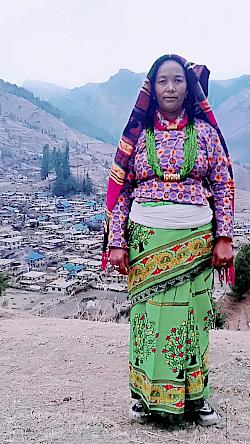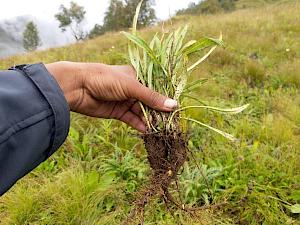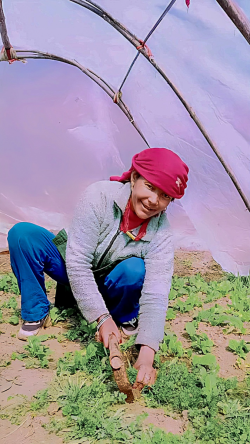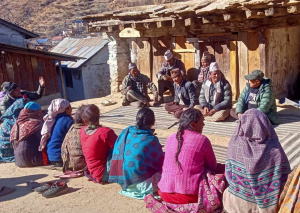The Himalayan Women Harvesters Who Move Mountains
Following her husband’s death and miles from her homeland, Ramila made a bold choice – to return to the untamed mountains of Nepal’s Himalayas.

Nestled within a valley, the village of Ramila’s childhood stands as the second-to-last settlement before the landscape ascends into alpine forests and snow-capped peaks. The scenery was both familiar and changed since she had left for India in pursuit of a fresh start. Now, as a widow with four children to care for, life promised no easy path.
Ramila had left behind an intimate community of wild plant harvesters when she travelled to India with her late husband. But the difficulties of this lifestyle had led her away from the mountains, seeking a different future for her family.
Upon her return, the village felt void of its male residents, who had taken similar journeys to find employment elsewhere. As Ramila adjusted to being a single parent, she faced the daunting challenge of supporting her family in this unforgiving environment. Though reconnecting with her community brought some comfort, Ramila looked to the future with a mix of hope and uncertainty.

That was seven years ago. Today, Ramila runs her own business, specialising in the harvest and sale of wild plants such as Jatamansi, Kutki, and Caterpillar Fungus, renowned for their use in traditional medicine and cosmetics. Alongside managing her business, she also cares for her children, tends to her vegetable patch, and looks after the livestock.
Yet, the way of life Ramila has carved out for herself and her family is still under threat. Overharvesting, climate change, and habitat loss threaten the survival of Himalayan plants and the communities reliant on them. Aware of their interdependence, the villagers are striving to find ways to fix this. As Ramila states, “It’s necessary to find a balance in conserving the plants, and the traditional livelihoods of my people”.
Ramila’s journey is intertwined with the efforts of TRAFFIC and its partner, the Asia Network for Sustainable Agriculture and Bioresources (ANSAB), who work in Nepal to support women like Ramila, who rely on the trade of wild plants to provide for themselves and their families. This collaborative effort not only ensures the conservation of these precious plants but also empowers Himalayan communities, with 40% of the people benefitting being women.

Working with TRAFFIC with funding from the UK government's Darwin Initiative, ANSAB helps to connect villagers with buyers, and provides them with sustainable harvesting certifications. Beyond advocating for the rights of Himalayan harvesters, the partnership nurtures the growth of local enterprises. This support allows men to stay in their villages, easing the burden on women and keeping families together.
Engaged in a male-dominated trade, Ramila has faced her share of challenges. Among them were concerns about receiving fair prices from traders, which weighed heavily on her mind. However, with two years of support from ANSAB, she now enjoys a secure business-to-business relationship with traders in Kathmandu. This newfound stability has helped to ease her worries.

Speaking from snowy Jumla in western Nepal, her unwavering smile gives no indication of the hardships she continues to face. “I’m happy and fulfilled despite the challenges of mountain life”, Ramila says.
A woman of resilience – Ramila is as tough as the landscape from which she was born. Proudly identifying as a woman of the Himalayas, she persists in overcoming the challenges posed by the terrain. “I’m proud to be a steward of this environment and benefit from its resources,” she affirms. “I feel a sense of ownership of this land, and the responsibility to protect it for future generations.”
Ramila follows in the footsteps of her ancestors, inheriting the knowledge of wild plants from her parents. As the monsoon clouds retreat, the villagers embark on their annual pilgrimage to the alpine forests for the harvesting season, which spans from September to December. At an altitude of 4800 metres – over half the height of Mount Everest – they gather their harvest.

During harvest, women typically shoulder the more painstaking tasks. For instance, they specialise in gathering seeds from the thorny Himalayan wild cherry – a task traditionally expected to be done by women.
Harvesting in the Himalayas presents challenges beyond the high altitude and spiky vegetation. Steep terrain can lead to injuries, from broken bones to fatalities caused by rockslides. Unpredictable weather, such as hailstorms, snowfall, and rain, forces villagers to seek shelter in caves or makeshift tents. Some even resort to loans to afford the essential equipment, but an unlucky harvest season could plunge families into financial crisis with no means of support.
Despite these risks, the harvesting season holds immense importance for the villagers. Beyond the opportunity to earn income, they cherish working in such an awe-inspiring environment. Ramila reflects, “Once I reach the harvesting area, I feel at peace. The scenery is beautiful, and I forget the difficulties of the long walk. There are many kinds of birds and wildlife in the alpine forests.”

Ramila’s strength in the face of adversity has allowed her to achieve one of her greatest dreams - to send her children to school. She proudly shares, “my eldest children have all gone to high school. As I didn’t have the chance to study, sending my children to school has been really important. They now teach me mathematics and writing.”
Looking forward, Ramila remains optimistic about the future of her business, especially with the continued support of ANSAB and TRAFFIC. As an active member of her community’s forest user group, Ramila shares the information she has learned through ANSAB on sustainable practices to protect the forests that support her. Last year, she also contributed to the development of the Jadibuti Delcaration to 2030, a roadmap outlining sustainable management practices for Nepal’s wild plants and fungi.
Having moved mountains to protect her family, Ramila’s resilience embodies the exact determination required to protect the flora of the Himalayas — which serves as a vital lifeline for so many.
Her story and passionate stewardship of the mountains that sustain her provide hope for the future of other threatened landscapes, species, and communities that depend on a healthy balance between people and nature.
Notes:
- Trade in wild species is one of the world's most pressing conservation and development challenges.
- Global supply chains involving wild plants and animals support the livelihoods of millions of people, particularly those in impoverished regions.
- At the same time, illegal trade, which ranks among the most profitable criminal activities globally, fuels environmental degradation and economic losses.
- TRAFFIC is driving action to combat illegal trafficking and enhance the benefits of legal and sustainable trade of wild species.
- As a trusted global advisor, TRAFFIC generates evidence, analysis, and solutions to strengthen global and national policy frameworks, while establishing responsible and equitable supply chains.
About the Darwin Initiative

Funded by the UK Government through the Darwin Initiative.
The Darwin Initiative is a UK government programme with a focus on biodiversity projects.
About Asia Network for Sustainable Agriculture and Bioresources (ANSAB)

Established in 1992, ANSAB has a vision of rural South Asia built on rich biodiversity and prosperous communities. This vision includes rich, healthy and productive ecosystems actively managed and sustainably used by formerly poor local communities. It also features adaptive people and resilient ecosystems able to cope with global climate change. Generate and implement community-based, enterprise-oriented solutions that conserve biodiversity and improve the livelihoods of the poorest of the poor while bolstering national economic development and addressing climate change is the mission of ANSAB.
ANSAB has implemented conservation and development programmes in more than 30 districts of Nepal and provided policy inputs and services to the government and development partners in seven Asian countries. ANSAB has introduced FSC certification in Nepal, supported enterprises in achieving organic and wildlife-friendly certification, supported NTFPs collector groups and producer enterprises for their management practices complying with FairWild standards, and led successful on-the ground implementation of the UKAID funded Darwin Initiative project 25-018. After the successful implementation of the project 25-018, UKAID funded Darwin Initiative program further provided the project 28-026 for the upscaling of the successes.




